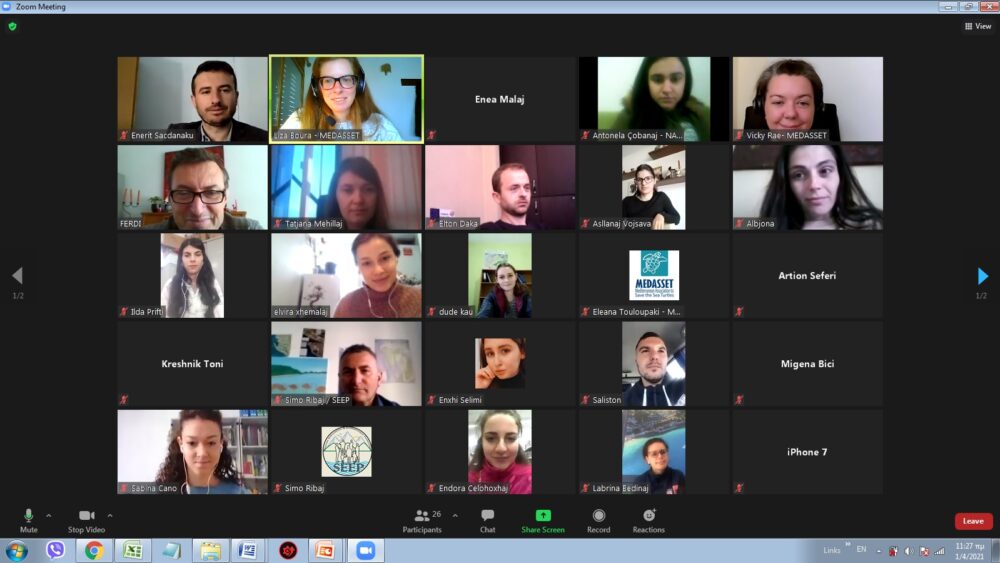April 6, 2021
An online meeting was held on 1 April 2021 among Albanian experts and officials, within the framework of the regional project “Conservation of marine turtles in the Mediterranean Region”. The meeting marked the launch of the second phase of project activities in Albania, which is being implemented by MEDASSET in collaboration with Dr. Enerit Sacdanaku, with funding from the MAVA Foundation.1
Following a successful first phase of the project in 2018-2019,1 activities shall continue in 2021-2022 with research, training and conservation. “Through a one-year aerial drone survey in Drini Bay we will map the distribution of the sea turtle population that is using the area for feeding and development and we will continue to collect isotope and genetic samples to improve our understanding of the populations present in Albanian waters”, explained Vicky Rae, MEDASSET’s Scientific Officer.
Although it is known that important sea turtle populations feed and overwinter in Albania’s coastal waters,3 it was only in 2018 that the first officially confirmed hatched nest was recorded at Divjaka beach. “We will continue to offer training activities for the staff of the protected areas on the identification and management of sporadic nesting” added Dr. Enerit Sacdanaku. To further enhance collaboration among key actors, a local network among local authorities and stakeholders will be organized. This will be accompanied by the development of “citizen science” training materials, to achieve increased identification of sea turtle nesting, sightings, strandings, etc.
The project will also assist Albania to address a key priority that has been acknowledged at a Mediterranean level as an important method to fill knowledge gaps and inform conservation strategies: the establishment of a National sea turtle stranding monitoring network. Lastly, progress made to implement the National Action Plan on sea turtle conservation (adopted in 2012) will be assessed and a revised roadmap to accomplish conservation objectives will be produced.
The activities were discussed among the meeting participants, which included Antonela Cobanaj and Migena Bici of the National Agency for Protected Areas and representatives of the Regional Agencies of Protected Areas: Lezhe (Toni Kreshnik) Durrës (Dude Kau); Vlorë (Nexhip Hysolakoj, Artion Seferi, Tatjana Mehillaj); Fier (Adrian Koci, Elton Daka, Elton Daka, Enea Malaj, Ervin Allushi). The meeting was also followed by Dr. Ferdinand Bego of the Faculty of Natural Sciences of the University of Tirana, and representatives of the UNDP and of NGOs “Social Education & Environment Protection”, “Herpetofauna Albanian Society” and “Protection and Preservation of Natural Environment in Albania”.
MEDASSET4 and Dr. Sacdanaku warmly thanked the Ministry of Tourism and Environment, the National Agency for Protected Areas and the representatives of the Regional Agencies of Protected Areas for their collaboration, which was strengthened and renewed during the meeting, for the implementation of the project in 2021-2022.
Please download the Press Release Albanian
Contact:
Dr. Enerit Sacdanaku, lead researcher, Tel.: 00355 68 41 03 150
Liza Boura, Programmes Officer, MEDASSET, Tel.: +30 210 3613572, [email protected]
Project photos: https://flic.kr/s/aHskUmPQyq
Project website: https://medmarineturtles.org/
Project video: www.youtube.com/watch?v=VzqefgxrSWc&t=6s
Notes to Editors:
[1] The project activities in Albania are implemented by MEDASSET in collaboration with Dr. Enerit Sacdanaku, within the framework of the regional project “Conservation of marine turtles in the Mediterranean Region” which is funded by the MAVA Foundation and is being implemented by ARCHELON, DEKAMER, MEDASSET, MedPAN, NMPZ, RAC/SPA (leader), WWF Greece, WWF Turkey.
[2] For more information on the results of the first phase of the project in Albania: www. medmarineturtles.org/news/52-press-release-officials-and-experts-meet-to-discuss-research-results-on-sea-turtle-nesting-in-albania
[3] Three of the seven species of sea turtles are found in the Mediterranean. The loggerhead (Caretta caretta) and green turtles (Chelonia mydas) nest here, and the huge leatherback (Dermochelys coriacea) is an occasional visitor. All species are included in the IUCN Red list of threatened species. Sea turtles are cold-blooded, air breathing, egg laying reptiles that spend their mysterious lives at sea but return each summer to the same area they were born to deposit their eggs in the sand. They take 20-30 years to mature and may live up to 100 years. Despite having travelled the world’s seas since the age of the Dinosaurs, their survival is threatened due to coastal development, pollution, collision with vessels, fisheries and climate change. Each summer sea turtles lay their eggs on sandy beaches in the east and south regions of the Mediterranean basin (mainly Greece, Turkey, Cyprus, etc). In the past years, a small number of sea turtle nests have been reported in Italy, Spain and other locations where nesting has not usually occurred in the past. This so-called “sporadic” nesting is of high scientific and conservation interest as it may indicate a possible shift in the nesting range of sea turtles towards the west and northern areas of the Mediterranean. Sea turtles are a highly migratory species and they may be responding to climatic changes by using new habitats to nest, feed and overwinter.
[4] With roots back to 1983, MEDASSET was founded in 1988 in the UK and in 1993 in Greece. It is an international NGO registered as a not-for profit organisation in Greece. MEDASSET plays an active role in the study and conservation of sea turtles and their habitats throughout the Mediterranean, through scientific research, environmental education, advocacy and awareness raising. The organisation is a partner to the United Nations Environment Programme’s Mediterranean Action Plan (UNEP/MAP) and a Permanent Observer-Member to the Bern Convention, Council of Europe, since 1988.
MEDASSET has implemented the “Rapid Assessment Survey of important marine turtle and monk seal habitats in the coastal area of Albania” in 2005 and the project “Monitoring and Conservation of Important Sea Turtle Feeding Grounds in the Patok Area of Albania” during 2008-2010. Subsequently, in 2011, in close collaboration with the Ministry of Environment, MEDASSET prepared “Management Recommendations for Drini Bay” and the “Action Plan for the Conservation of Sea Turtles and their Habitats in Albania” which was adopted by the Minister of Environment in 2012.



Comments are closed.